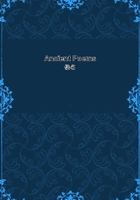
第31章
[THIS very curious ballad, or, more properly, metrical romance, was originally published by the late Doctor Whitaker in his HISTORY OFCRAVEN, from an ancient MS., which was supposed to be unique.
Whitaker's version was transferred to Evan's OLD BALLADS, the editor of which work introduced some judicious conjectural emendations. In reference to this republication, Dr. Whitaker inserted the following note in the second edition of his HISTORY:-This tale, saith my MS., was known of old to a few families only, and by them held so precious, that it was never intrusted to the memory of the son till the father was on his death-bed. But times are altered, for since the first edition of this work, a certain bookseller [the late Mr. Evans] has printed it verbatim, with little acknowledgment to the first editor. He might have recollected that THE FELON SEWE had been already reclaimed PROPERTYVESTED. However, as he is an ingenious and deserving man, this hint shall suffice. - HISTORY OF CRAVEN, second edition, London, 1812.
When Sir Walter Scott published his poem of Rokeby, Doctor Whitaker discovered that THE FELON SEWE was not of such 'exceeding rarity'
as he had been led to suppose; for he was then made acquainted with the fact that another MS. of the 'unique' ballad was preserved in the archives of the Rokeby family. This version was published by Scott, who considered it superior to that printed by Whitaker; and it must undoubtedly be admitted to be more complete, and, in general, more correct. It has also the advantage of being authenticated by the traditions of an ardent family; while of Dr.
Whitaker's version we know nothing more than that it was 'printed from a MS. in his possession.' The readings of the Rokeby MS., however, are not always to be preferred; and in order to produce as full and accurate a version as the materials would yield, the following text has been founded upon a careful collation of both MSS. A few alterations have been adopted, but only when the necessity for them appeared to be self-evident; and the orthography has been rendered tolerably uniform, for there is no good reason why we should have 'sewe,' 'scho,' and 'sike,' in some places, and the more modern forms of 'sow,' 'she,' and 'such,' in others. If the MSS. were correctly transcribed, which we have no ground for doubting, they must both be referred to a much later period than the era when the author flourished. The language of the poem is that of Craven, in Yorkshire; and, although the composition is acknowledged on all hands to be one of the reign of Henry VII., the provincialisms of that most interesting mountain district have been so little affected by the spread of education, that the FELON SEWEis at the present day perfectly comprehensible to any Craven peasant, and to such a reader neither note nor glossary is necessary. Dr. Whitaker's explanations are, therefore, few and brief, for he was thoroughly acquainted with the language and the district. Scott, on the contrary, who knew nothing of the dialect, and confounded its pure Saxon with his Lowland Scotch, gives numerous notes, which only display his want of the requisite local knowledge, and are, consequently, calculated to mislead.
The FELON SEWE belongs to the same class of compositions as the HUNTING OF THE HARE, reprinted by Weber, and the TOURNAMENT OFTOTTENHAM, in Percy's RELIQUES. Scott says that 'the comic romance was a sort of parody upon the usual subjects of minstrel poetry.'
This idea may be extended, for the old comic romances were in many instances not merely 'sorts of parodies,' but real parodies on compositions which were popular in their day, although they have not descended to us. We certainly remember to have met with an old chivalric romance, in which the leading incidents were similar to those of the FELON SEWE.
It may be observed, also, in reference to this poem, that the design is twofold, the ridicule being equally aimed at the minstrels and the clergy. The author was in all probability a follower of Wickliffe. There are many sly satirical allusions to the Romish faith and practices, in which no orthodox Catholic would have ventured to indulge.
Ralph Rokeby, who gave the sow to the Franciscan Friars of Richmond, is believed to have been the Ralph who lived in the reign of Henry VII. Tradition represents the Baron as having been 'a fellow of infinite jest,' and the very man to bestow so valuable a gift on the convent! The Mistress Rokeby of the ballad was, according to the pedigree of the family, a daughter and heiress of Danby, of Yafforth. Friar Theobald cannot be traced, and therefore we may suppose that the monk had some other name; the minstrel author, albeit a Wickliffite, not thinking it quite prudent, perhaps, to introduce a priest IN PROPRIA PERSONA. The story is told with spirit, and the verse is graceful and flowing.]
FITTE THE FIRSTE.
YE men that will of aunters wynne, That late within this lande hath bin, Of on I will yow telle;And of a sewe that was sea strang, Alas! that ever scho lived sea lang, For fell folk did scho wele. Scho was mare than other three, The grizeliest beast that ere mote bee Her hede was greate and graye;Scho was bred in Rokebye woode, Ther war few that thither yoode, But cam belive awaye.
Her walke was endlang Greta syde, Was no barne that colde her byde, That was fra heven or helle; Ne never man that had that myght, That ever durst com in her syght, Her force it was sea felle.
Raphe of Rokebye, with full gode wyll, The freers of Richmonde gav her tyll, Full wele to gar thayme fare;Freer Myddeltone by name, Hee was sent to fetch her hame, Yt rewed him syne full sare.